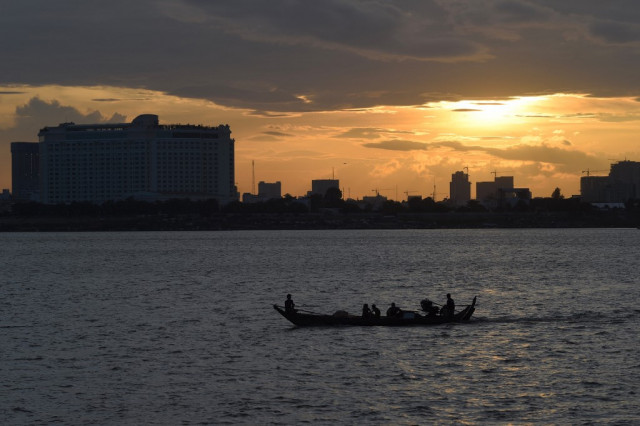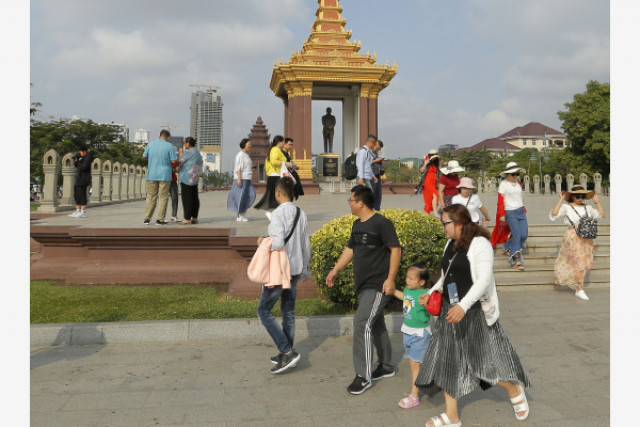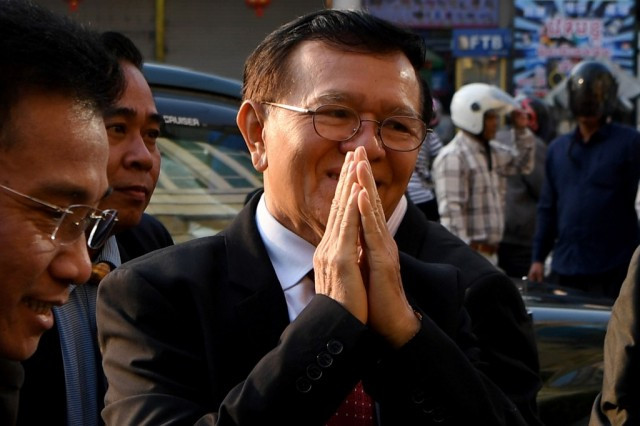Government Largely Silent on Chinese Hacking Scandal

- By Gerald Flynn
- July 23, 2021 10:52 AM
Evidence that state-sanctioned Chinese hackers spied on Cambodia’s Ministry of Foreign Affairs prior to multilateral talks over the Mekong River in 2018 have been met with silence from officials
PHNOM PENH--Four Chinese hackers, three of whom are believed to be security officials working for the Chinese government, were charged in the United States with numerous counts of computer intrusion crimes that targeted a range of businesses, universities and government entities across the US and beyond.
The cyber-attacks were allegedly carried out between 2011 and 2018, according to the US Department of Justice which released a statement regarding the now-unsealed indictment on July 19.
“On or about January 10, 2018, members of the conspiracy infiltrated the network of Cambodian Government Ministry A and stole data pertaining to discussions between the Governments of China and Cambodia over use of the Mekong River,” the Grand Jury indictment dated November 2019 read.
The indictment details how Cambodian linguists were then “recruited” by “members of the conspiracy” to translate stolen data—the data in question was reportedly linked to the Lancang-Mekong Cooperation Leaders’ Summit that took place in Phnom Penh in January 2018 and was hailed “a great success” by Chinese state media.
The 30-page indictment lists a wide range of victims targeted by the Chinese hackers, but two sources familiar with the matter confirmed that “Cambodian Government Ministry A,” whose data was allegedly stolen in January 2018 ahead of multilateral discussions regarding the Mekong River, was in fact the Ministry of Foreign Affairs and International Cooperation.
Koy Kuong, spokesperson for the Ministry of Foreign Affairs, has so far declined to comment on the matter and would not confirm whether he was aware of any data breaches perpetrated by Chinese hackers. Sources have stated that the Foreign Affairs Ministry was informed of the hack as long as six months ago.
“Cambodia has an Anti-Cybercrime Department at the Ministry of Interior and the Ministry of Posts and Telecommunications also has a protection system,” said Phay Siphan, a spokesperson for the government who added that any information the government has on Mekong summits are publicly available and therefore hacking is unnecessary.
He went on to call the accusations of hacking “inappropriate” and accused the US of attempting to stir up tensions between China and Cambodia.
However, Cambodian government officials’ heavy reliance on personal emails, phones and unencrypted messaging apps to conduct official business was not something Siphan would discuss.
Instead, Siphan then referred reporters to the Chinese Embassy in Phnom Penh, saying that they had already commented on the hacking scandal.
Despite multiple calls to the Chinese Embassy in Phnom Penh and an email requesting further information, the embassy did not reply.
Chinese Embassy Facebook Post Closest Thing to Official Response
Instead, the closest thing to an official statement from any government, came in the form of a Facebook post from the Chinese Embassy where officials did not deny hacking the Cambodian government, but instead condemned cyber-attacks in general before launching into a tirade against both Reuters—where the story first broke—and the US government.
Even Fresh News only deigned to report on the Chinese Embassy’s Facebook post rather than citing any Cambodian official on the matter.
The Chinese Embassy’s Facebook post called out the US’s own involvement in cyber-attacks, calling it “the largest source of cyber-attacks in the world, and even its ‘allies’ are not spared” in an apparent reference to 2013, when it was uncovered that the US National Security Agency had been listening in on German Chancellor Angela Merkel’s conversations. But while US spying on the German leader was met with outrage among German politicians and the German public, Cambodian officials have remained silent in face of allegedly being hacked by their own closest ally.
“They’ll say look at the US spying on Germany! But I think what they’ll do is say nothing,” said Sophal Ear, an associate professor of diplomacy and world affairs at Occidental College in California. “They don’t even want to score a point that way; it’s better to just ignore. They don’t have to answer to their own people; they sure well won’t deign the press asking any questions.”
Sophal suggested that the deepening ties between China and Cambodia, which have previously come under scrutiny regarding the level influence China has over Cambodian affairs, raised the question of whether cyber-attacks were necessary, given the relations between the two countries at the time of the alleged hack.
“Just looking at news reports from January 2018, the headlines suggest an already warm and intimate relationship,” he said, citing China’s promise to build Cambodia’s first satellite and develop infrastructure throughout Cambodia. “Premier Li [Keqiang] visited to boost the Lancang meeting. While it wasn’t the naked ironclad friendship it is today, it was clear the embrace had begun. Publicly the trust was building.”
Tragedy of the Commons on the Mekong
The Mekong River has now become a source of contention among countries through which it flows, with Chinese dams exerting greater control over the upper end of the river—which China calls the Lancang—creating myriad issues for countries at the lower end of the Mekong.
Deadly floods, droughts and a wide range of consequences for farming communities across the riparian nations have been partly attributed to the control China enjoys of the river’s flow, but despite the growing urgency of the situation, Phnom Penh has so far refused to criticize China’s hydropower operations and instead opted to place the blame on climate change.
Experts have repeatedly warned that the issues facing communities reliant on the Mekong River are resultant of not just climate change or Chinese dams, but a range of forces at work, including deforestation, changes in land use and intensive farming practices. Such a problem, scientists have stressed, requires a collaborative and holistic solution.
While it is unclear what data the US Department of Justice alleges that Chinese hackers have stolen from Cambodia or what edge said data would have given the Chinese government in negotiating terms with the lower Mekong nations, the lack of cooperation and transparency over the management of the Mekong River has stymied any effective progress.
“There seems to be no appetite on Cambodia’s part to go after China for the dams it has built upriver,” said Sophal. “Instead, what you see in the Mekong is the tragedy of the commons. Let’s all build as much as possible before someone else does. Of course every dam cuts off an arm or kills the Mekong little by little. It’s death by, not a thousand cuts, but by a couple of dozen cuts.”
While Sophal noted that nobody is going to war over the Mekong, he added that anti-China sentiment over the control of water resources is rising, notably in Vietnam, due to conflicts over the South China Sea. This in turn has seen the region’s waters become something of a proxy war, with both China and the US vying for influence among Southeast Asia nations, but Sophal noted that the Mekong presents a different challenge.
“China, I’m sure, doesn’t appreciate the US pointing out how this Chinese behavior harms the Mekong countries, but the problem isn’t that you have the Mekong countries not wanting dams on the Mekong. To varying degrees, they all want dams for themselves, so again, it’s do as I say not as I do,” he concluded. “That tragedy of the commons means everyone wants to grab a piece for themselves and block others from touching the Mekong. It’s a prisoner’s dilemma game.”
Additional reporting by Phoung Vantha















